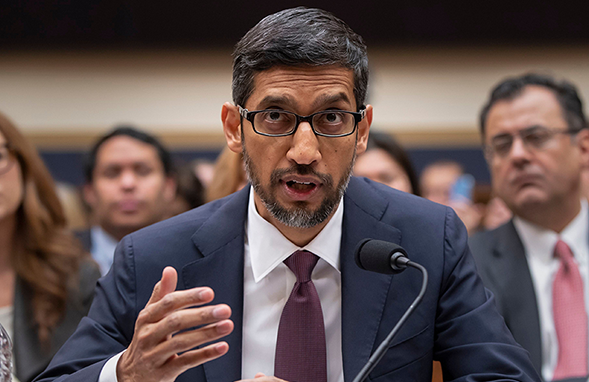
Google CEO, Sundar Pichai was called in for an over three hour congressional hearing at the Capitol Hill on Tuesday. At the end of the session, attendees argued that the US congress wasted away an opportunity to bring up the search engine’s more questionable activities
Google CEO, Sundar Pichai faced a three and half hour congressional hearing at the Capitol Hill on Tuesday. The leader of the biggest global search engine defended the giant against charges of political bias, data collection policies and the engine’s efforts in China.
Referring to a series of sessions between the Congress and officials from social media sites such as Facebook, Twitter and Google, initiated soon after 2016 US Presidential elections, Californian Diplomat, Ted Lieu said “This is now the fourth hearing in a series of ridiculous hearings on the free speech of internet companies,” adding, “A significant portion of this hearing was a waste of time.” He argued that the big concern with the search giant was not filtration of information, but its data collection policies. Lieu pointed out that another major concern was Google’s efforts in China that could help aid citizen censorship by the government.
The session with the Google CEO was the first of its kind, prior to which, Google’s Chief Privacy Officer, Keith Enright and YouTube’s Director of Public Policy, Juniper Downs have appeared in front of the legislature. Many observers, however, agreed with Californian diplomat, Lieu in suggesting that the congressional meet with the Google leader left out several key issues.
The Executive Director of the Center for Digital Democracy asserted, “Instead of really getting to the nuts and bolts, they used this highly rare opportunity to focus on highly partisan issues that don’t get to the bottom of the problem, which is Google’s overall business model.”
The meeting, however, did discuss Google’s controversial Dragonfly project in China. The project would create a censored search engine that would allow the Chinese government to easily track search queries of its citizens.
It has been almost a decade since the search giant left China, on Tuesday, Sundar Pichai said the reason for re-entering the country was reinforcement of the right to information for all people. He asserted, “We are always compelled, across the world, to provide access to information.”
Last month, several Google software engineers published a joint letter with Amnesty International to CEO Pichai demanding the cancellation of the Dragonfly project. On Tuesday, the Google leader admitted that “Over a Hundred” people were currently working on the project.
Despite an over three hour long session many attendees argued that the congressional hearing could have been used to focus on more questionable activities instead of making the bias in filtering information the key issue, for which the giant was found not guilty.








